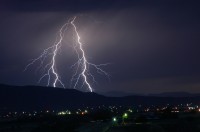In this day and age there are plenty of reasons to buy a used generator. For one thing power supplies from utility grids are not as reliable thanks to the increasing frequency of bad weather and also natural disasters like earthquakes and hurricanes.
Having a stand-by or emergency source of power is a good idea especially if you or your business is dependent on electricity. For instance it could be a disaster for a hospital or construction site to lose power.
The bottom line is that generators provide that extra level of security that makes sure that all of your operations run smoothly. At home you may need lighting, refrigeration and appliances at the very least and if you have a disabled person in the home you may also need a lift of some kind. Apartment buildings need to make sure that they have sufficient power running to prevent residents from being stuck in an elevator or unable to enter the building.
Many businesses and residences also need electricity to keep their security systems operating.
Residential Uses
If you own a home you need not suffer or be inconvenienced in any way if you have a back-up generator in place. Electricity from a stand-by generator can help lighting, entertainment equipment, appliances, HVAC, computers, air conditioners and security systems operating.
A unit for home use can be quite small. Some homes can get by with a generator that is only 10 kW. Anything larger will provide you with all of your power needs for quite a long time. Usually the generator is installed outside, and resembles the installation of an air conditioning unit.
Small Business Uses
Small businesses can benefit from having a back-up power generator. This is especially true if you are running a lot of computers. Sudden power loss can lead to data loss if you are not careful and computer crashes happen when the power grid surges or goes off suddenly. Owning a power generator can keep power running continuously so that technology is not compromised.
Determining the size of the unit that a business needs is somewhat dependent how much money your business makes and also how much voltage you will need to run the entire business without interruption. This is calculated by calling in an electrician who can correctly calculate your daily electricity load based on you absolute necessary needs including phones, processing equipment, refrigerators, security etc.
Continuous Use Generators Can Be Economical
If you own a large business or small industry the right size genset can allow you to use it as a primary source of power if your normal sources or utilities get too expensive. If you are in business this could allow you to keep your prices lower than your competition that does not have a generator and is still attached to the grid.
A Primary Source of Power
Although many of us view a power generator as being a unit that is used for back-up or in an emergency they are also needed for facilities of all kinds that need power in remote places that are not attached to a power grid. You often see units operating as the prime source of power in developing countries where there is a lot of construction where what little electricity there is might be costly and unreliable. In fact, entire Islands in the South Pacific are all that is needed to supply power to the entire population.
A unit creating prime power is defined as one that operates for eight to twelve hours a day. It does not necessarily mean that the power is on 24 hours a day. These types of industrial machines are used for applications like mining.
The price of generators really does vary and buying a used genset can really be worth your while whether you want to use it at home, for a small or large business or as a primary source of continuous power in an area where there is no power grid.


